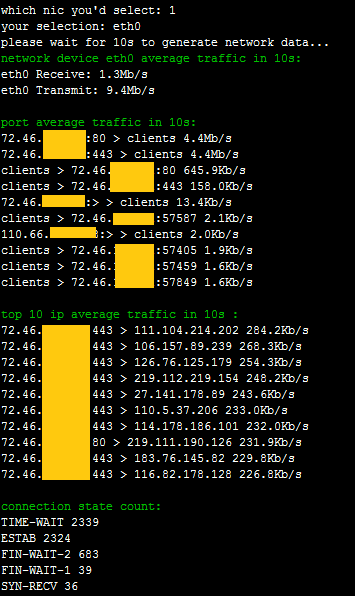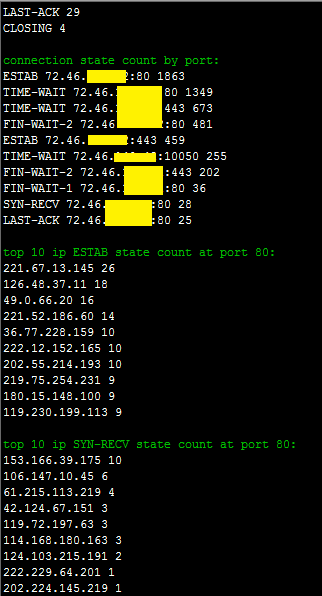您好,登錄后才能下訂單哦!
您好,登錄后才能下訂單哦!
本篇內容介紹了“如何編寫一個強大的網絡分析shell腳本”的有關知識,在實際案例的操作過程中,不少人都會遇到這樣的困境,接下來就讓小編帶領大家學習一下如何處理這些情況吧!希望大家仔細閱讀,能夠學有所成!
腳本運行效果截圖:


此腳本包含的功能有:
1、實時監控任意網卡的流量
2、統計10秒內平均流量
3、統計每個端口在10秒內的平均流量,基于客戶端和服務端端口統計。可以看出哪些端口占流量比較大,對于web服務器,一般是80端口。其它端口受到攻擊時,也有可能其它端口流量比較大。所以此功能可以幫助我們端口流量是否正常。
4、統計在10s內占用帶寬最大的前10個ip。此項功能可以幫助我們來查出是否有惡意占用帶寬的ip。
5、統計連接狀態。此項功能可以讓我們看出哪些連接狀態比較大。如果SYN-RECV狀態比較多的話,有可以受到半連接攻擊。如果ESTABLISED非常大,但通過日志發現沒有那么多請求,或者通過tcpdump發現大量ip只建立連接不請求數據的話,可能是受到了全連接攻擊,這時候如果你使用的是nginx服務器,可以在配置文件增加listen 80 deferred來防止。
6、統計各端口連接狀態。當可能受到攻擊時,此項功能可以幫助我們發現是哪個端口受到攻擊。
7、統計端口為80且狀態為ESTAB連接數最多的前10個IP。此項功能可以幫助我們來找出創建連接過多的Ip,進而屏蔽。
8、統計端口為80且狀態為SYN-RECV連接數最多的前10個IP。當受到半連接攻擊時,此項功能可以幫助我們找到惡意ip。
用到的網絡分析工具:
1、tcpdump:此腳本用tcpdump來統計基于ip或基于端口的流量。
2、ss: 此腳本用ss命令來統計連接狀態,實際使用發現ss比netstat高效得多。
3、/proc/net/dev,用來統計指定網卡的流量。
腳本下載地址:https://www.centos.bz/wp-content/uploads/2014/06/network-analysis.sh
下面貼出完整的腳本:
代碼如下:
#!/bin/bash
#write by zhumaohai(admin#centos.bz)
#顯示菜單(單選)
display_menu(){
local soft=$1
local prompt="which ${soft} you'd select: "
eval local arr=(\${${soft}_arr[@]})
while true
do
echo -e "#################### ${soft} setting ####################\n\n"
for ((i=1;i<=${#arr[@]};i++ )); do echo -e "$i) ${arr[$i-1]}"; done
echo
read -p "${prompt}" $soft
eval local select=\$$soft
if [ "$select" == "" ] || [ "${arr[$soft-1]}" == "" ];then
prompt="input errors,please input a number: "
else
eval $soft=${arr[$soft-1]}
eval echo "your selection: \$$soft"
break
fi
done
}
#把帶寬bit單位轉換為人類可讀單位
bit_to_human_readable(){
#input bit value
local trafficValue=$1
if [[ ${trafficValue%.*} -gt 922 ]];then
#conv to Kb
trafficValue=`awk -v value=$trafficValue 'BEGIN{printf "%0.1f",value/1024}'`
if [[ ${trafficValue%.*} -gt 922 ]];then
#conv to Mb
trafficValue=`awk -v value=$trafficValue 'BEGIN{printf "%0.1f",value/1024}'`
echo "${trafficValue}Mb"
else
echo "${trafficValue}Kb"
fi
else
echo "${trafficValue}b"
fi
}
#判斷包管理工具
check_package_manager(){
local manager=$1
local systemPackage=''
if cat /etc/issue | grep -q -E -i "ubuntu|debian";then
systemPackage='apt'
elif cat /etc/issue | grep -q -E -i "centos|red hat|redhat";then
systemPackage='yum'
elif cat /proc/version | grep -q -E -i "ubuntu|debian";then
systemPackage='apt'
elif cat /proc/version | grep -q -E -i "centos|red hat|redhat";then
systemPackage='yum'
else
echo "unkonw"
fi
if [ "$manager" == "$systemPackage" ];then
return 0
else
return 1
fi
}
#實時流量
realTimeTraffic(){
local eth=""
local nic_arr=(`ifconfig | grep -E -o "^[a-z0-9]+" | grep -v "lo" | uniq`)
local nicLen=${#nic_arr[@]}
if [[ $nicLen -eq 0 ]]; then
echo "sorry,I can not detect any network device,please report this issue to author."
exit 1
elif [[ $nicLen -eq 1 ]]; then
eth=$nic_arr
else
display_menu nic
eth=$nic
fi
local clear=true
local eth_in_peak=0
local eth_out_peak=0
local eth_in=0
local eth_out=0
while true;do
#移動光標到0:0位置
printf "\033[0;0H"
#清屏并打印Now Peak
[[ $clear == true ]] && printf "\033[2J" && echo "$eth--------Now--------Peak-----------"
traffic_be=(`awk -v eth=$eth -F'[: ]+' '{if ($0 ~eth){print $3,$11}}' /proc/net/dev`)
sleep 2
traffic_af=(`awk -v eth=$eth -F'[: ]+' '{if ($0 ~eth){print $3,$11}}' /proc/net/dev`)
#計算速率
eth_in=$(( (${traffic_af[0]}-${traffic_be[0]})*8/2 ))
eth_out=$(( (${traffic_af[1]}-${traffic_be[1]})*8/2 ))
#計算流量峰值
[[ $eth_in -gt $eth_in_peak ]] && eth_in_peak=$eth_in
[[ $eth_out -gt $eth_out_peak ]] && eth_out_peak=$eth_out
#移動光標到2:1
printf "\033[2;1H"
#清除當前行
printf "\033[K"
printf "%-20s %-20s\n" "Receive: $(bit_to_human_readable $eth_in)" "$(bit_to_human_readable $eth_in_peak)"
#清除當前行
printf "\033[K"
printf "%-20s %-20s\n" "Transmit: $(bit_to_human_readable $eth_out)" "$(bit_to_human_readable $eth_out_peak)"
[[ $clear == true ]] && clear=false
done
}
#流量和連接概覽
trafficAndConnectionOverview(){
if ! which tcpdump > /dev/null;then
echo "tcpdump not found,going to install it."
if check_package_manager apt;then
apt-get -y install tcpdump
elif check_package_manager yum;then
yum -y install tcpdump
fi
fi
local reg=""
local eth=""
local nic_arr=(`ifconfig | grep -E -o "^[a-z0-9]+" | grep -v "lo" | uniq`)
local nicLen=${#nic_arr[@]}
if [[ $nicLen -eq 0 ]]; then
echo "sorry,I can not detect any network device,please report this issue to author."
exit 1
elif [[ $nicLen -eq 1 ]]; then
eth=$nic_arr
else
display_menu nic
eth=$nic
fi
echo "please wait for 10s to generate network data..."
echo
#當前流量值
local traffic_be=(`awk -v eth=$eth -F'[: ]+' '{if ($0 ~eth){print $3,$11}}' /proc/net/dev`)
#tcpdump監聽網絡
tcpdump -v -i $eth -tnn > /tmp/tcpdump_temp 2>&1 &
sleep 10
clear
kill `ps aux | grep tcpdump | grep -v grep | awk '{print $2}'`
#10s后流量值
local traffic_af=(`awk -v eth=$eth -F'[: ]+' '{if ($0 ~eth){print $3,$11}}' /proc/net/dev`)
#打印10s平均速率
local eth_in=$(( (${traffic_af[0]}-${traffic_be[0]})*8/10 ))
local eth_out=$(( (${traffic_af[1]}-${traffic_be[1]})*8/10 ))
echo -e "\033[32mnetwork device $eth average traffic in 10s: \033[0m"
echo "$eth Receive: $(bit_to_human_readable $eth_in)/s"
echo "$eth Transmit: $(bit_to_human_readable $eth_out)/s"
echo
local regTcpdump=$(ifconfig | grep -A 1 $eth | awk -F'[: ]+' '$0~/inet addr:/{printf $4"|"}' | sed -e 's/|$//' -e 's/^/(/' -e 's/$/)\\\\\.[0-9]+:/')
#新舊版本tcpdump輸出格式不一樣,分別處理
if awk '/^IP/{print;exit}' /tmp/tcpdump_temp | grep -q ")$";then
#處理tcpdump文件
awk '/^IP/{print;getline;print}' /tmp/tcpdump_temp > /tmp/tcpdump_temp2
else
#處理tcpdump文件
awk '/^IP/{print}' /tmp/tcpdump_temp > /tmp/tcpdump_temp2
sed -i -r 's#(.*: [0-9]+\))(.*)#\1\n \2#' /tmp/tcpdump_temp2
fi
awk '{len=$NF;sub(/\)/,"",len);getline;print $0,len}' /tmp/tcpdump_temp2 > /tmp/tcpdump
#統計每個端口在10s內的平均流量
echo -e "\033[32maverage traffic in 10s base on server port: \033[0m"
awk -F'[ .:]+' -v regTcpdump=$regTcpdump '{if ($0 ~ regTcpdump){line="clients > "$8"."$9"."$10"."$11":"$12}else{line=$2"."$3"."$4"."$5":"$6" > clients"};sum[line]+=$NF*8/10}END{for (line in sum){printf "%s %d\n",line,sum[line]}}' /tmp/tcpdump | \
sort -k 4 -nr | head -n 10 | while read a b c d;do
echo "$a $b $c $(bit_to_human_readable $d)/s"
done
echo -ne "\033[11A"
echo -ne "\033[50C"
echo -e "\033[32maverage traffic in 10s base on client port: \033[0m"
awk -F'[ .:]+' -v regTcpdump=$regTcpdump '{if ($0 ~ regTcpdump){line=$2"."$3"."$4"."$5":"$6" > server"}else{line="server > "$8"."$9"."$10"."$11":"$12};sum[line]+=$NF*8/10}END{for (line in sum){printf "%s %d\n",line,sum[line]}}' /tmp/tcpdump | \
sort -k 4 -nr | head -n 10 | while read a b c d;do
echo -ne "\033[50C"
echo "$a $b $c $(bit_to_human_readable $d)/s"
done
echo
#統計在10s內占用帶寬最大的前10個ip
echo -e "\033[32mtop 10 ip average traffic in 10s base on server: \033[0m"
awk -F'[ .:]+' -v regTcpdump=$regTcpdump '{if ($0 ~ regTcpdump){line=$2"."$3"."$4"."$5" > "$8"."$9"."$10"."$11":"$12}else{line=$2"."$3"."$4"."$5":"$6" > "$8"."$9"."$10"."$11};sum[line]+=$NF*8/10}END{for (line in sum){printf "%s %d\n",line,sum[line]}}' /tmp/tcpdump | \
sort -k 4 -nr | head -n 10 | while read a b c d;do
echo "$a $b $c $(bit_to_human_readable $d)/s"
done
echo -ne "\033[11A"
echo -ne "\033[50C"
echo -e "\033[32mtop 10 ip average traffic in 10s base on client: \033[0m"
awk -F'[ .:]+' -v regTcpdump=$regTcpdump '{if ($0 ~ regTcpdump){line=$2"."$3"."$4"."$5":"$6" > "$8"."$9"."$10"."$11}else{line=$2"."$3"."$4"."$5" > "$8"."$9"."$10"."$11":"$12};sum[line]+=$NF*8/10}END{for (line in sum){printf "%s %d\n",line,sum[line]}}' /tmp/tcpdump | \
sort -k 4 -nr | head -n 10 | while read a b c d;do
echo -ne "\033[50C"
echo "$a $b $c $(bit_to_human_readable $d)/s"
done
echo
#統計連接狀態
local regSS=$(ifconfig | grep -A 1 $eth | awk -F'[: ]+' '$0~/inet addr:/{printf $4"|"}' | sed -e 's/|$//')
ss -an | grep -v -E "LISTEN|UNCONN" | grep -E "$regSS" > /tmp/ss
echo -e "\033[32mconnection state count: \033[0m"
awk 'NR>1{sum[$(NF-4)]+=1}END{for (state in sum){print state,sum[state]}}' /tmp/ss | sort -k 2 -nr
echo
#統計各端口連接狀態
echo -e "\033[32mconnection state count by port base on server: \033[0m"
awk 'NR>1{sum[$(NF-4),$(NF-1)]+=1}END{for (key in sum){split(key,subkey,SUBSEP);print subkey[1],subkey[2],sum[subkey[1],subkey[2]]}}' /tmp/ss | sort -k 3 -nr | head -n 10
echo -ne "\033[11A"
echo -ne "\033[50C"
echo -e "\033[32mconnection state count by port base on client: \033[0m"
awk 'NR>1{sum[$(NF-4),$(NF)]+=1}END{for (key in sum){split(key,subkey,SUBSEP);print subkey[1],subkey[2],sum[subkey[1],subkey[2]]}}' /tmp/ss | sort -k 3 -nr | head -n 10 | awk '{print "\033[50C"$0}'
echo
#統計端口為80且狀態為ESTAB連接數最多的前10個IP
echo -e "\033[32mtop 10 ip ESTAB state count at port 80: \033[0m"
cat /tmp/ss | grep ESTAB | awk -F'[: ]+' '{sum[$(NF-2)]+=1}END{for (ip in sum){print ip,sum[ip]}}' | sort -k 2 -nr | head -n 10
echo
#統計端口為80且狀態為SYN-RECV連接數最多的前10個IP
echo -e "\033[32mtop 10 ip SYN-RECV state count at port 80: \033[0m"
cat /tmp/ss | grep -E "$regSS" | grep SYN-RECV | awk -F'[: ]+' '{sum[$(NF-2)]+=1}END{for (ip in sum){print ip,sum[ip]}}' | sort -k 2 -nr | head -n 10
}
main(){
while true; do
echo -e "1) real time traffic.\n2) traffic and connection overview.\n"
read -p "please input your select(ie 1): " select
case $select in
1) realTimeTraffic;break;;
2) trafficAndConnectionOverview;break;;
*) echo "input error,please input a number.";;
esac
done
}
main
“如何編寫一個強大的網絡分析shell腳本”的內容就介紹到這里了,感謝大家的閱讀。如果想了解更多行業相關的知識可以關注億速云網站,小編將為大家輸出更多高質量的實用文章!
免責聲明:本站發布的內容(圖片、視頻和文字)以原創、轉載和分享為主,文章觀點不代表本網站立場,如果涉及侵權請聯系站長郵箱:is@yisu.com進行舉報,并提供相關證據,一經查實,將立刻刪除涉嫌侵權內容。